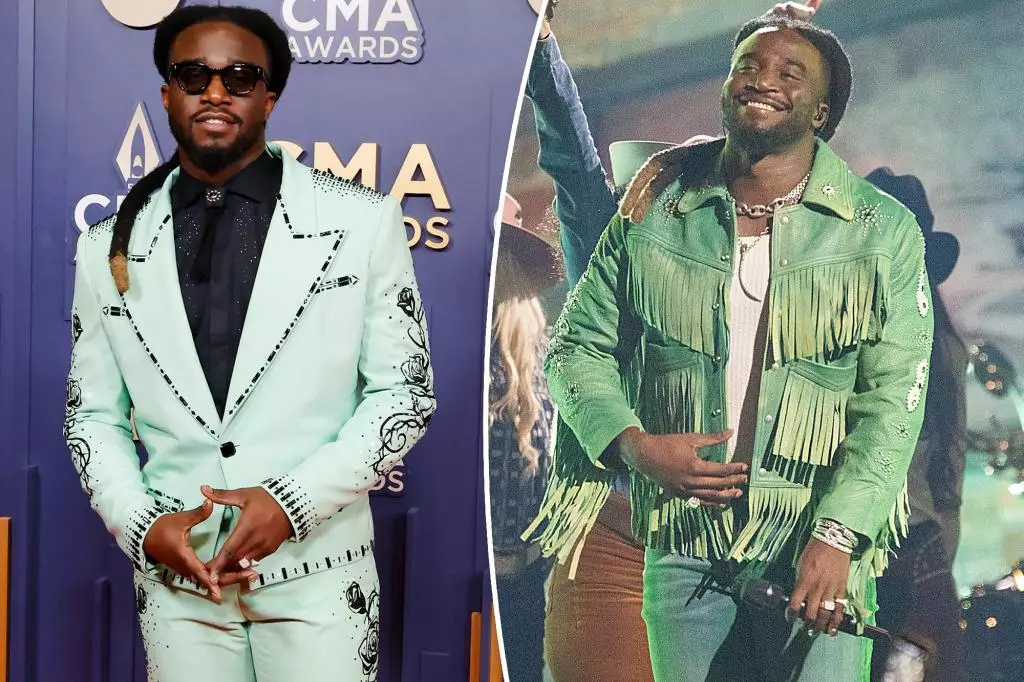The Country Music Association (CMA) Awards have always been a focal point of conversation in the realm of country music, but this year, the discourse took a poignant turn with the underwhelming recognition of rising star Shaboozey. Despite his groundbreaking achievements, particularly in relation to his hit song “A Bar Song (Tipsy),” which dominated the charts, the young artist left the ceremony without any accolades—a reality that prompted backlash from fans and observers alike.
Shaboozey, at just 29 years old, has quickly made a name for himself in a predominantly white genre. His track “A Bar Song (Tipsy)” has not only topped the charts but also changed the narrative for Black artists in country music. The song recently became the longest-running solo No. 1 in Billboard Hot 100 history—an impressive feat that speaks volumes about his talent and broad appeal. Furthermore, his collaboration on Beyoncé’s genre-blending album “Cowboy Carter” positioned him at the intersection of country and popular music, allowing him to reach a diverse audience.
However, being a nominee at the CMAs for two prestigious awards—New Artist of the Year and Single of the Year—yet walking away empty-handed has ignited a fiery conversation about the landscape of country music. Despite the history-making nature of his chart success, the CMAs failed to honor his contributions, leading to questions about the authenticity of recognition within the industry.
Fans expressed their discontent on social media, with common themes echoing throughout their messages. Many critiques suggested that the CMAs seemed to showcase diversity without genuine commitment to it. One user on X contended that Shaboozey’s nomination effectively served as a performative gesture intended to quell criticism regarding racial exclusion within the award show. This sentiment was echoed by several voices lamenting that despite Shaboozey’s contributions, he appeared to be an anomaly rather than a part of an evolving culture wherein Black artists are equally recognized.
Viewers pointed to the prevalence of white artists dominating award categories, suggesting that Shaboozey’s experience highlights a broader systemic issue. Fans noted the ironic narrative in which leading Black artists in country music still face hurdles when seeking validation from established platforms. Despite Shaboozey’s impressive trajectory this past year, his experiences raise questions about whether the country music industry truly values the contributions of Black artists or if they remain sidelined, serving occasionally to fulfill diversity quotas.
The CMAs have long been criticized for their lack of diversity, and this year’s awards may only serve to underline entrenched biases. Commentators have referenced the comments made by Luke Bryan, who advised Beyoncé to immerse herself fully in “the country world” in order to garner recognition. Such statements perpetuate the notion that acceptance in country music relies heavily on adhering to particular tropes considered “authentic” to the genre, a viewpoint that can marginalize artists who do not fit the traditional mold.
The frustration arising from Shaboozey’s losses at the CMAs isn’t solely about him but a broader commentary on how Black artists are often expected to navigate a system that may not be entirely welcoming. One fan articulated the similarities in their experiences, suggesting that both Shaboozey and Beyoncé experienced exclusion despite their commercial successes, reinforcing a narrative that highlights the industry’s reluctance to fully embrace artists outside of its established demographic.
As the dust settles from the awards show, the path forward for the country music genre remains riddled with challenges. Critiques surrounding the CMAs should not just serve as a moment of outrage but also as a catalyst for rethinking diversity, recognition, and acceptance within country music. Artists like Shaboozey represent more than just a single voice—they are part of a movement reshaping the landscape of a historically exclusionary genre.
Real change necessitates not just the acknowledgment of Black artists but creating an equitable environment where their contributions are celebrated without conditions or performative gestures. It is imperative for both award shows and the country music industry as a whole to take a hard look in the mirror, as the success of artists like Shaboozey should not only be measured in chart positions but also in consistent recognition and opportunities in what has long been a homogeneous space.
The future of country music doesn’t solely rest on the shoulders of artists willing to “play the game.” Instead, it’s about challenging the very rules of the game to ensure that it welcomes diverse narratives, voices, and sounds that genuinely reflect the breadth of human experience.
